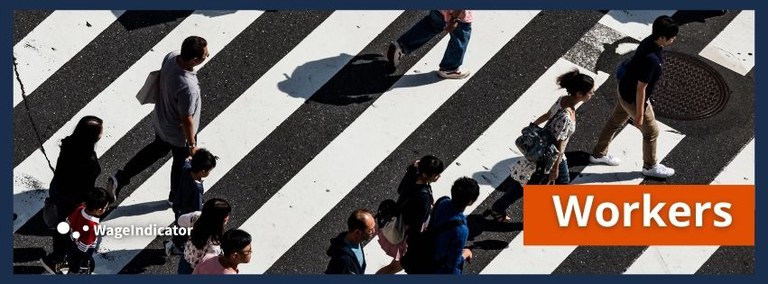JOIN ‘A LEVEL PLAYING FIELD OF GIG WORKERS,’
WAGEINDICATOR’S NEW GIG WEBINAR ON OCTOBER 27, 2023
How can gig workers regain their negotiation power and build a collective voice?
Join 'A Level Playing Field for Gig Workers.' WageIndicator’s new webinar will take place on Friday, 27 October 2023, from 2 pm to 3.30 pm CEST.
During this event, we want to explore how collective bargaining, representation, and bottom-up ownership and governance can help create a power balance in the platform economy between the companies and the workers.
You can learn more about the speakers and the topics they will cover by visiting the event’s webpage.
You will receive updates in the run-up to the webinar.
We hope to see you there!

Out now! New Gig Blog
Towards a workable regulatory environment for Europe's platform economy
More regulation for the platform economy is rapidly emerging. The goal of these new laws is a fair platform economy for all.
What impact do they have? How can we make legislation more workable for everyone? And how do these lessons help us prepare for new regulations around technology like Artificial Intelligence?
From the Platform Economy lectureship of The Hague University of Applied Science, platform expert Martijn Arets organized the 'Working Conference on Regulating Digital Platforms' together with PwC and Considerati.
In this new blog on Gigpedia.org, he shares his insights:
New interns
In the past few weeks, a group of interns worldwide has joined the WageIndicator Gig team.
They have different backgrounds and experiences but share the enthusiasm for news and curiosity to learn more about the platform economy.
The internship will last between 8 and 12 weeks, allowing them to improve their use of information sources and research and visualization tools.
The results will soon be visible on Gigpedia.
And to the new interns, we wish you good luck!

Dear reader,
In the platform economy scenario, regulators and advocates are making huge efforts to propose new legislative solutions gig workers can count on.
Unfortunately, gig work is so hard to regulate.
Platform companies have seen more regulations imposed on them in the past few years than in the 20 years before, and there are some recent, positive examples: see the Rajasthan Platform Based GIG Workers Bill, 2023, tabled in July.
However, corporate resistance shows no signs of weakening, often challenging law implementation.
About this, let us focus on the most relevant news of the past two weeks.
In Pakistan, despite Fairwork and the Centre for Labour Research’s efforts to enhance the Islamabad Capital Territory Platform Workers Protection Bill, a draft legislation aiming to improve working conditions in the platform economy, the biggest challenge remains to balance the opportunities this industry offers with defending labor rights.
According to the latest Fairwork Pakistan report, all six major companies rated (Bykea, Careem, inDrive, Uber, Foodpanda, and GharPar) scored zero.
With an estimated 700,000 platform workers relying on platforms to earn a living, regulation to protect and promote minimum work standards is currently absent, and platform workers operate in a grey area that falls outside the rights offered for employed workers in Pakistan’s labor legislation.
Moving to Spain, we can see that to comply with the Rider Law, which came into force in August 2021, Glovo introduced some changes to its labor model, such as stopping assigning time slots. However, the Glovo business model has remained mainly unchanged, which is why the Minister of Labor, Yolanda Díaz, promised severe measures against those relying on “false autonomous riders.”
This week’s news is that reclassifying Glovo’s riders from self-employed to salaried workers could cost the company up to 400 million euros in terms of social security contributions, delayed payments, fines, and VAT claims. The calculations have been made by Delivery Hero, the German group that owns more than 99 % of the company.
What concerns Glovo the most are not only the fines received for allegedly violating labor laws or the rulings recognizing the existence of an employment relationship with its riders; it’s also the new Employment law, in force since March of this year, empowering the Labor Inspectorate to demand the payment of fines without the need for a judicial decision. It means several investigation procedures related to Glovo's old business model could reach a final administrative phase in 2023.
Meanwhile, in Brazil, the special commission of the Labor Ministry, created to reach a consensus on a regulatory framework for the platform work, organized a meeting with the Brazilian Association of Mobility and Technology (Amobitec) to discuss riders' and drivers’ remuneration. Responsible for bringing together leading companies in the delivery app market, such as iFood, Amazon, 99, Uber, and Lalamove, Amobitec presented a new remuneration proposal. On their side, workers, represented by the National Association of Platform Delivery Workers (ANEA), claimed no progress in the negotiation and made a national alert for a possible strike on September 12. Drivers and delivery riders have been waiting for any improvements since the latest presidential election campaign when Luiz Inácio Lula da Silva expressed his intention to address the regulation of platform work. Brazil already has more than 1.5 million and a half riders and drivers. Still, platform work also involves microwork, housework, and care services. In all these situations, there is an absence of guarantees or responsibilities on the contractor's part.
Ultimately, we are keeping an eye on the Australian government’s commitment to introduce legislation giving gig workers more rights, including minimum pay rates.
To explain the current lack of labor rights for the category, the Workplace Relations Minister Tony Burke said: “At the moment, you turn up to the Fair Work Commission, and the Fair Work Commission asks the initial question, 'Are you an employee?'"
Under the legislation, the Fair Work Commission would use a new test to determine if someone fits a new worker class. Uber, in response, said it supported a minimum earnings rate and compulsory accident insurance coverage but warned it could become costly if not implemented carefully.
Have a nice day,
The WageIndicator Gig Team

Brazil - A common worry among drivers and riders is that their cycles, motorbikes, or bags might be stolen if left unattended.
Colombia - The Ministry of Labor and the digital delivery companies reached an agreement to regulate the platform work: if the labor reform, filed before Congress in March 2023, is approved, companies will be called to pay 60% of each worker's health and pension contribution, leaving the remaining 40% to the worker.
Hungary - A group of domestic taxi driving players is attacking the Estonian company, condemning Bolt’s trademark use and denouncing “tax anomalies and avoidance.”
Indonesia - Hundreds of Jakarta and West Java online motorcycle and taxi drivers, members of the Indonesian Ojol Union, protested mass in Yogyakarta over their poor working conditions and low tariffs.
Serbia - As the latest Fairwork Serbia report shows, the most prominent digital platforms in the country (Glovo, Wolt, CarGo, MrD, and Uradi-zaradi) are far from ensuring fairness to their workers.
Slovenia - They are still discussing the assignment of ID numbers to food delivery riders operating in Ljubljana.
United States - Uber has started automatically dispatching yellow taxis to any New York City customer requesting an UberX, the company’s standard offering. Uber added the iconic yellow cabs to its app in 2022 and plans on offering a cheaper travel option if the taxis are exempted from congestion taxes.

Brazil
- On platforms like Amazon Mechanical Turk, microwork has become tougher in recent years: workers usually take on projects consisting of hundreds of quick and repetitive tasks and are forced to handle long work shifts.
- The outsourced company responsible for recruiting iFood workers seems to have disappeared with the money it should have paid to 80 riders.
Did you know? In Austria, riders’ working conditions differ significantly from platform to platform. Lieferando employs all of its riders regularly, and they are entitled to a minimum hourly wage. On the contrary, only seven percent of the Foodora riders are permanently employed; the others work as independent contractors.
India - As part of the Telangana Gig and Platform Workers’ campaign in Hyderabad called #LowFareNoAir, drivers working for cab aggregators like Ola and Uber agreed to boycott rides to and from the airport if fares are less than 2,000 rupees.
Pakistan - Women are quitting the gig economy, struggling to compete with men without gender-intentional incentives.
South Africa - The traffic police in Johannesburg started confiscating Bajaj Qute vehicles operating on the Bolt ride-hailing platform because the drivers did not have valid operating licenses. Bolt has launched trips on these compact quadricycles in early August.
Spain
- The Barcelona taxi drivers union, Élite Taxi, has called a slow march to Parliament on September 5 to protest against the fine of 123,000 euros the Catalan Competition Authority imposed on them. They received this penalty for a "boycott" campaign against Uber and other platforms.
- Glovo and Uber Eats have temporarily suspended their services in Madrid due to storm Dana.
Did you know? The Trade Union’s Congress (TUC), the UK’s largest trade union, has launched a new taskforce to draft legislation formalizing the protection of workers amid the increasing use of AI technologies. Recent contentious examples include Just Eat drivers reporting being deactivated for minor infractions or Uber drivers taking legal action over facial recognition technology.
United States - The Justice For App Workers group called for a rider and driver general meeting in New York.
Did you know? According to organizations supporting asylum seekers, thousands of migrants arrived in New York City last year. Many of them entered the platform delivery market to sustain their families.
Uruguay - The ride-hailing sector is witnessing a drop in drivers due to the high costs and the struggle to lease vehicles.

China - Food delivery giant Meituan posted a 33.4% rise in second-quarter revenue, though executives warned of headwinds for its core business in the quarter ahead.
Czech Republic - Wolt is introducing non-stop food, groceries, and other goods delivery in Prague.
India
- Uber has announced a new feature called "Group Rides" in India, allowing users to share trips with up to three others when traveling to a common destination.
- Swiggy is eyeing a 2024 stock market listing. It was valued at $10.7 billion in its last fundraising in 2022.
- If an Uber or Ola driver cancels a ride after accepting it, passengers should receive a rebate: this is what a panel appointed by the Maharashtra government has recommended. These draft rules will come into effect only after the government’s approval.
Did you know? The Open Network for Digital Commerce, the Government’s alternative to Zomato or Swiggy in the online food delivery market, reported that 50,000 restaurants are now live for placing orders on its platform.
Kenya - Uber launched an electric motorbike service in Kenya, its first in Africa, aiming to make its global platform emissions-free by 2040.
Nigeria
- Jumia Food and Glovo are the companies with the strongest presence in the food delivery market in Lagos.
- According to Bolt, Nigerians and other individuals living within the country have used its transportation application for over 250 million rides since the firm began operations in 2016.
Indonesia - Grab's shares jumped 11%, the biggest gain in three months, reflecting strong demand for its ride-hailing and food delivery segments and cost-cutting measures.
United Arab Emirates - Deliveroo has unveiled a new feature allowing customers to add grocery items to their takeaway without placing a new order.
United States - Uber Eats is developing an AI-powered chatbot that will offer recommendations to users, allowing them to place orders more quickly.

